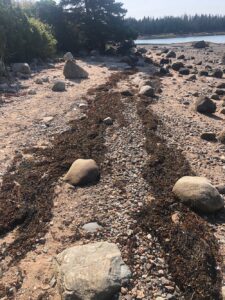“Seaweed bill would turn Maine’s coast into 3,000 miles of public land and threaten an ecosystem.” Arguments against LD 2003, which would open the intertidal zone to unregulated rockweed harvesting and recreation.
The Weekly Packet (Penobscot Bay Press)
January 4, 2024
FORUM
Seaweed bill would turn Maine’s coast into 3,000 miles of public land and threaten an ecosystem.
BY JOHN BOIT
Maine’s Senate president is sponsoring a bill that would endanger a vital coastal ecosystem and dramatically change centuries of law. With more than 3,000 miles of coastline the stakes are high.
The bill, LD 2003 seeks to alter 400 years of law that has granted the public the right to three activities in Maine’s intertidal zone: fishing, fowling and navigation. This ill-conceived bill would now absurdly categorize rockweed harvesting as “fishing.”
“It’s horrible legislation,” said Bailey Bowden, chair of the shellfish conservation committee for my town of Penobscot. “People are going to come in and hack the heck out of the rockweed.”
Cutting rockweed, he says, is different than just taking clams from mudflats – it’s harvesting the very ecosystem itself.
“Rockweed sequesters carbon. It reduces wave action and is a buffer for erosion. And it’s home to hundreds of species that live in its fronds,” said Bowden, whose common sense conservation views helped restore the alewife populations in the Bagaduce River. “I would be less upset if rockweed were being used to cure cancer. But most of it is being used for fertilizer, pet food and cosmetics.”
Bowden is not alone in opposing the bill. Maine Coast Heritage Trust, one of the state’s largest conservation groups, will be testifying against the proposed law because it seeks to overturn two Maine supreme court cases: the Ross decision of 2019, in which the court upheld the landowners do indeed own the rockweed in the intertidal zone, and the Moody Beach decision of 1990 that denied recreational access to Maine’s intertidal zone. MCHT’s stance is that the courts, not the Legislature, should decide these matters. (Full disclosure: My wife is the president of MCHT.)
To be clear, I am not opposed to Maine’s developing seaweed industry, just as I am not opposed to fishing, hunting, logging, or responsibly harvesting many things in nature. But if this industry is going to grow, we need some ground rules for everyone’s sake.
Today, boats show up unannounced sometimes working on behalf of a large Canadian seaweed company. They cut the rockweed and pile it in bags on shore. A truck comes and takes it away for processing and profit. The landowner has no recourse or payment, and there is no consequence for the heist in broad daylight that just occurred.
Would the Senate president, a logger from Aroostook, like it if a foreign company showed up on his land, filled a truck with his wood, made no payment to him, and bore no responsibility to ensure regeneration. Would any lawmaker? Would any landowner?
 The bill also attempts to slip the word “recreation” into one of the allowable uses of intertidal zones. I’m all for increasing access to coastal areas but this overly simplistic fix opens a giant can of worms. Suddenly thousands of miles of coastline would now become Maine’s newest, but unregulated, state park. Millions of summer visitors would be able to camp, hike, picnic or party on any stretch of shoreline in Maine. The problems of trash, human waste and forest fires will become exponentially bigger overnight. The tragedy of the commons will be on full display from Kittery to Lubec.
The bill also attempts to slip the word “recreation” into one of the allowable uses of intertidal zones. I’m all for increasing access to coastal areas but this overly simplistic fix opens a giant can of worms. Suddenly thousands of miles of coastline would now become Maine’s newest, but unregulated, state park. Millions of summer visitors would be able to camp, hike, picnic or party on any stretch of shoreline in Maine. The problems of trash, human waste and forest fires will become exponentially bigger overnight. The tragedy of the commons will be on full display from Kittery to Lubec.
Instead let’s do this:
First leave 400 years of law alone. If you want to come to Maine and harvest rockweed from the Maine coast, you should have to secure permission from the landowner, period.
Second, we need to have far better consensus on what constitutes a “sustainable harvest.” I’ve heard different respectable scientists who study Maine seaweed give me completely opposing views on what is sustainable. If we can’t answer that question then we shouldn’t be cutting an inch of seaweed. We need a summit of scientists, conservationist and, yes, harvesters to figure this out.
Third, if we as a state decide that harvesting should proceed, we need strong regulation and serious enforcement. As the industry grows so should marine patrols.
Fourth, if we want more coastal access to coastal lands – and I firmly do – then the state should increase funding for conservation efforts, rather than take land by eminent domain. Anything less risks billions in lawsuits from shoreland owners up and down the coast.
Now is the time to get involved. The Joint Standing Committee on Marine Resources will hold a hearing on LD 2003 on Thursday January 11, at 1 p.m. at the Cross Building in Augusta. Showing up will be an important step in helping our lawmakers understand there is a better path to protecting Maine’s coastal resources, creating sustainable jobs, and avoiding conflicts over property rights.
John Boit lives in Penobscot. He is a member of the board of directors of the Bagaduce Watershed Association.